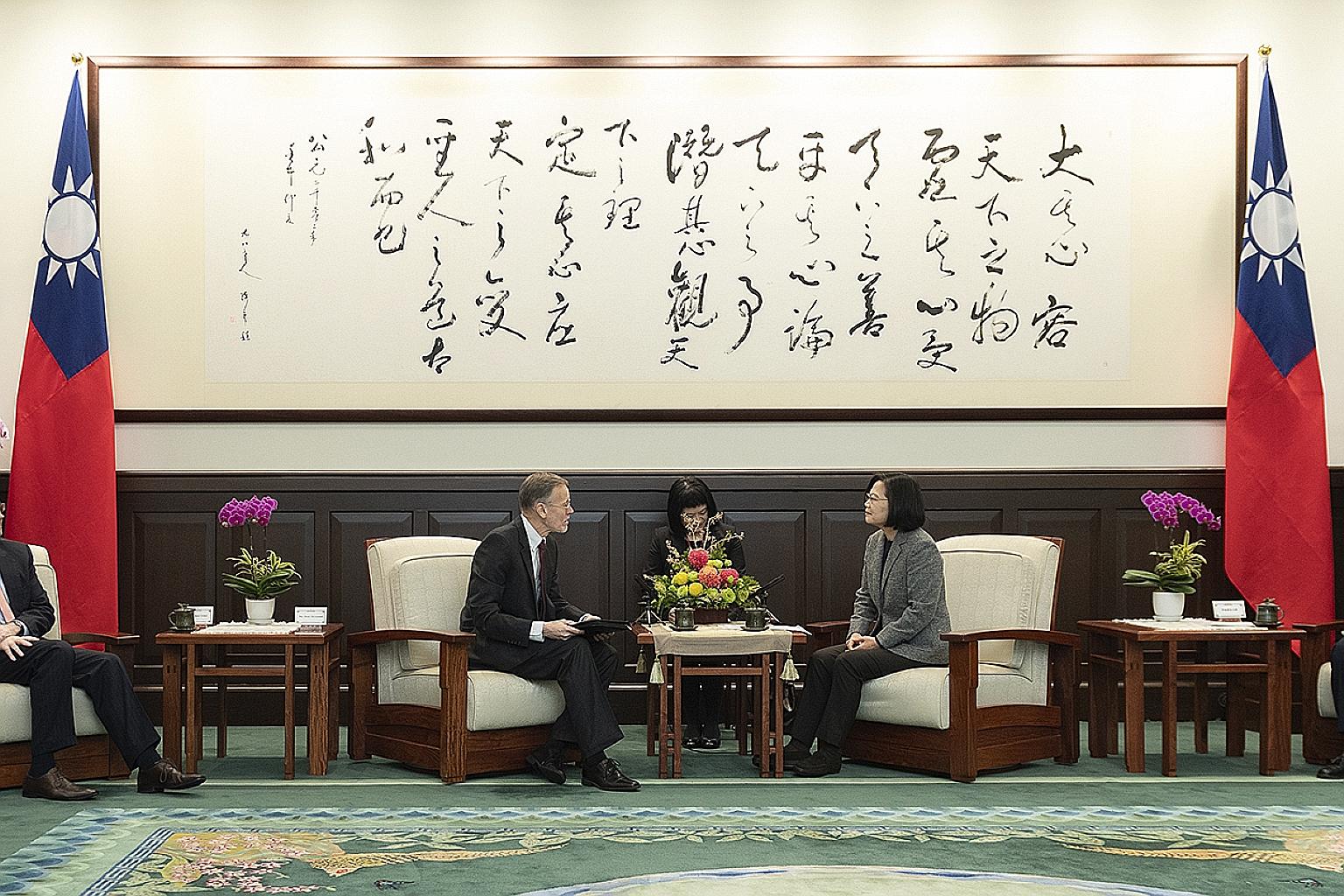Election trouncing prompts calls for reform within Taiwan's KMT
Its ageing leadership, China policies face scrutiny as it fails to connect with youth
Sign up now: Get insights on Asia's fast-moving developments

Taiwan President Tsai Ing-wen meeting director of the American Institute in Taiwan William Brent Christensen yesterday, a day after her landslide election victory. While Ms Tsai was widely expected to win, the margin of her victory was fuelled by both external and domestic events, say experts.
PHOTO: ASSOCIATED PRESS
Katherine Wei, Katherine Wei Taiwan Correspondent In Taipei
Follow topic:
Following her landslide victory that secured Taiwan President Tsai Ing-wen a second term in office on Saturday, voices that called for the opposing Kuomintang (KMT) to reform came from within the party, as many pondered what exactly had led to its trouncing by Ms Tsai's Democratic Progressive Party (DPP).
A clear difference, not lost on voters, was the unity shown by the DPP in working towards a common goal, while the KMT has been divided since the last presidential election and in disarray.
"People also don't think Han Kuo-yu was qualified to run for president," said Assistant Professor Wang Ching-hsing, from National Cheng Kung University's Political Science Department, at an election post-mortem yesterday.
Professor of East Asian politics Shelley Rigger at Davidson College, North Carolina, thinks Mr Han is only a "symptom" but not the cause of the KMT's malaise. "The magnitude of losses has a lot to do with Han Kuo-yu personally, but not all because of him," she said.
While Ms Tsai was widely expected to win, the margin of her victory was fuelled by both external and domestic events, said Prof Wang. When Chinese President Xi Jinping discussed in his new year speech last year the "one country, two systems" framework designed for Taiwan, it gave Ms Tsai the opportunity to declare her firm stance against any threats to Taiwan's sovereignty, he said.
The protests in Hong Kong also gave her a similar platform that was well received among younger Taiwanese voters.
"Democracy and sovereignty is more appealing than Han's promotion of a better economy that might come at the cost of sovereign rights," said Prof Wang.
But the incumbent President's personal victory did not fully extend to her party. While the DPP secured over 50 per cent of legislature seats, compared with the KMT's 33.6 per cent, it lost seven seats - replaced by representatives from newer, smaller parties like the New Power Party, Taiwan People's Party and the Taiwan Statebuilding Party. These parties received enough party votes to gain a share of "at-large" legislative seats, which are allocated according to the percentage of party votes they receive.
The current electoral system for legislative elections in Taiwan was devised to give smaller parties an opportunity to break the two-party control in the legislature, but with it came volatility "for people to appear from nowhere and capture voters' attention... This is a perpetual source of uncertainty and anxiety for bigger party leaders," said Prof Rigger.
In the wake of the KMT's major losses, many have called for party reforms, including in its China policies and ageing leadership - something the KMT has resisted addressing.
Early yesterday, outgoing KMT legislator Hsu Yu-jen posted a scathing criticism of his own party on Facebook. While he blamed Mr Han, the Kaohsiung mayor, for the defeat, he also emphasised bigger structural issues within the KMT such as its overall style, and distance from Taiwan's current mainstream ideologies.
Mr Hsu, 41, compared the party to a machine controlled by its older leaders and slammed them for neglecting the younger generation of voters and touting the "1992 Consensus" as its main China policy.
"The KMT ought to rethink its cross-strait policy when 70 per cent of its voters under 45 have said in polls that they are 'anti-China'," said Mr Hsu.
KMT Youth Division head Hsiao Ching-yen agreed, saying in a Facebook post that the KMT suffered its defeat because of outdated cross-strait policies held by an outdated group of leaders who have been in power for decades.
"The Taiwanese society can agree that 'the Republic of China is in Taiwan', 'our sovereignty should not be threatened' and 'refuse unification with China'," said the 27-year-old. "As a political party in Taiwan, we should stand with the Taiwanese people and propose ideologies from their perspective."

